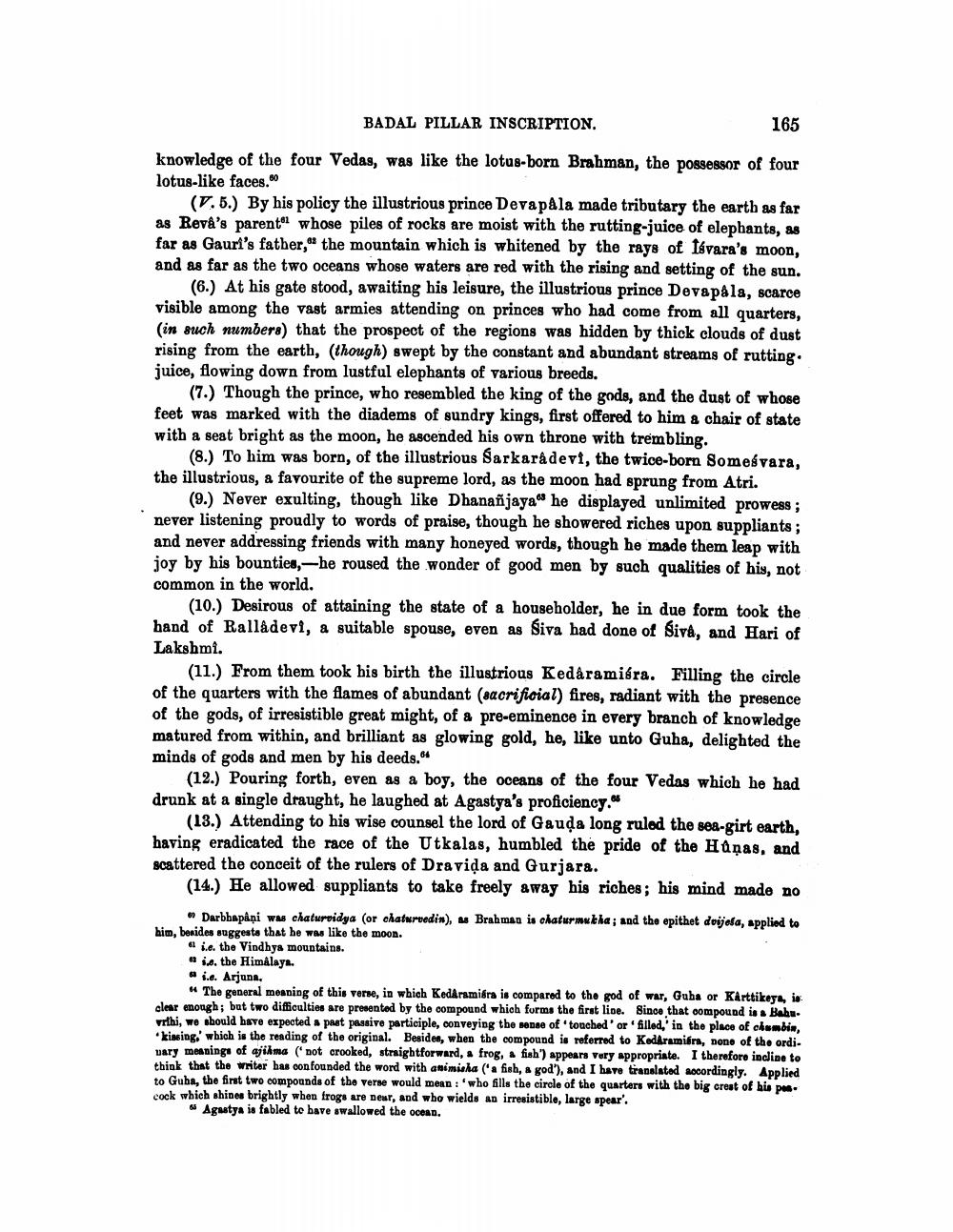________________
BADAL PILLAR INSCRIPTION.
165
knowledge of the four Vedas, was like the lotus-born Brahman, the possessor of four lotus-like faces.
(V.5.) By his policy the illustrious prince Devapala made tributary the earth as far as Reva's parent" whose piles of rocks are moist with the rutting-juice of elephants, as far as Gauri's father," the mountain which is whitened by the rays of fávara's moon, and as far as the two oceans whose waters are red with the rising and setting of the sun.
(6.) At his gate stood, awaiting his leisure, the illustrious prince Devapala, scarce visible among the vast armies attending on princes who had come from all quarters, (in such numbers) that the prospect of the regions was hidden by thick clouds of dust rising from the earth, (though) swept by the constant and abundant streams of rutting. juice, flowing down from lustful elephants of various breeds.
(7.) Though the prince, who resembled the king of the gods, and the dust of whose feet was marked with the diadems of sundry kings, first offered to him a chair of state with a seat bright as the moon, he ascended his own throne with trembling.
(8.) To him was born, of the illustrious Sarkaradevi, the twice-born Somesvara, the illustrious, a favourite of the supreme lord, as the moon had sprung from Atri.
(9.) Never exulting, though like Dhananjaya" he displayed unlimited prowess ; never listening proudly to words of praise, though he showered riches upon suppliants ; and never addressing friends with many honeyed words, though he made them leap with joy by his bounties, -he roused the wonder of good men by such qualities of his, not common in the world.
(10.) Desirous of attaining the state of a householder, he in due form took the hand of Ralladevi, a suitable spouse, even as Siva had done of Siva, and Hari of Lakshmi.
(11.) From them took his birth the illustrious Kedaramiéra. Filling the circle of the quarters with the flames of abundant (sacrificial) fires, radiant with the presence of the gods, of irresistible great might, of a pre-eminence in every branch of knowledge matured from within, and brilliant as glowing gold, he, like unto Guha, delighted the minds of gods and men by his deeds."
(12.) Pouring forth, even as a boy, the oceans of the four Vedas which he had drunk at a single draught, he laughed at Agastya's proficiency.
(13.) Attending to his wise counsel the lord of Gauda long ruled the sea-girt earth, having eradicated the race of the Utkalas, humbled the pride of the Haņas, and scattered the conceit of the rulers of Dravida and Gurjara.
(14.) He allowed suppliants to take freely away his riches; his mind made no
Darbhapaņi wa chaturvidya (or chaturvedin), as Brahman is chaturmukha; and the epithet doijofa, applied to him, besides suggests that he was like the moon.
a i.e. the Vindhya mountains.
is. the Himalaya. se. Arjuna.
The general meaning of this verne, in which KedAramisra is compared to the god of war, Guba or Karttikes, is clear enough; but two difficulties are presented by the compound which forms the first line. Since that compound is. Babuvrthi, we should have expected a past passive participle, conveying the sense of touched' or 'filled,' in the place of chambin,
kissing.' which is the reading of the original. Besides, when the compound is referred to Kedaramiar, none of the ordi. vary meanings of ajilma (not crooked, straightforward, a frog, fish') appears very appropriate. I therefore incline to think that the writer has confounded the word with animisha ("a fish, a god'), and I have translated ascordingly. Applied to Gubs, the first two compounds of the verse would mean: 'who fills the circle of the quarters with the big creat of his p. cock which shine brightly when frogs are Dear, and who wields an irresistible, large spear'.
# Agastya is fabled te bave swallowed the ocean.




